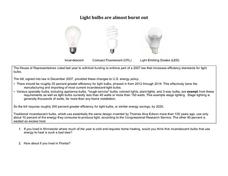Curated OER
NUMB3RS Activity: Regular Ploygon Centroids
Students investigate geo-profiling. In this secondary mathematics lesson, students use geo-profiling to determine the most probable location of a criminal. Students find the centroid of a polygon where the vertices represent...
Curated OER
Solving Imaginary Crimes
High schoolers participate in a forensic science activity. In this crime solving lesson plan, students investigate fingerprints, and other crime scene evidence to solve an imaginary crime.
Curated OER
Automobile-Accident Reconstruction
Students investigate an accident and relate it to math. In this trigonometry lesson, students measure the accident scene, the friction produced, and the speed from the skid marks. They create a poster of their findings.
Curated OER
Human Fingerprints: No Two the Same
Sixth graders explore scientific observations by analyzing a group of data. In this fingerprint identification instructional activity, 6th graders identify the reasoning behind fingerprinting and create their own ink fingerprints....
Curated OER
Our Town by Thornton Wilder
In this literature worksheet, students respond to 14 short answer and essay questions about Wilder's play Our Town. Students may also link to an online interactive quiz on the play at the bottom of the page.
Curated OER
Yemen Cargo Bombs Foiled
Learners explore an international terror alert originating in Yemen. In this lesson, students read an article that explains a terror alert in Britain, then complete several activities that reinforce the reading, including a...
Curated OER
Fahrenheit 451 Symbol & Test Review
Although the second page of this two-page sheet probably won't benefit you much (considering you won't have the materials referenced), you could still use the first page to assess your class's understanding of the symbols used in...
Curated OER
Hammurabi's Code: What Does It Tell Us About Old Babylonia?
Students examine life in Babylonia during the time of King Hammurabi. They read and discuss excerpts of the Code of Hammurabi, participate in a simulation of advisors to the king, complete an online interactive activity, answer...
Curated OER
Regents Review Worksheet #1: Principles of the U.S. Constitution
Kids who take the Regents Exam really need to know a lot of information. This is a wonderful exam review tool that includes 26 pages of questions, charts, and suggested readings to help upper graders pass the test. It focuses on all...
Heritage Foundation
Courts and Judges
If the Supreme Court is so supreme, why do all cases not just start there? High schoolers learn why every case does not start at the Supreme Court as well as the importance of hierarchy in the US judicial system in the 11th installment...
Heritage Foundation
Procedural Amendments: Amendments III, IV, and V
So many US Constitution clauses, so little time. The 17th installment in a 20-part series teaches pupils about the Third, Fourth, and Fifth Amendments. Learning through activities such as group work, connecting to current events, and...
K12 Reader
Three Levels of Government
Help your learners work their way through a reading assignment for informational text. Using context clues, they answer five comprehension question based on a short passage about the three levels of government: local government, state...
Curated OER
Why Do Governments Exist? Locke, Hobbes, Montesquieu, and Rousseau
Here is a great secondary source reading that includes the primary ideas and philosophies of the famed Enlightenment philosophers: Thomas Hobbes, John Locke, Charles Montesquieu, and Jean-Jacques Rousseau. In additional to discussing...
K5 Learning
What Police and Detectives Do
What do police and detectives do to keep their community safe? Six short-answer questions make up a worksheet designed to reinforce reading comprehensions skills while providing information about police officers and detectives.
Utah Education Network (UEN)
Vocabulary Consumerism
If you receive poor service, should you contact the FDA or the BBB? Discuss important economic terms with a vocabulary practice page. Learners fill in the blanks after each concept and elaborate on its function in the economy.
Teaching for Change
A Documents-Based Lesson on the Voting Rights Act
How did the Voting Rights Act affect the daily lives of American citizens? A document-based lesson developed by the Student Non-Violent Coordinating committee (SNCC) presents a case study of the impact of the Voting Rights Act of 1965 on...
Civil Rights Movement Veterans
Timeline of Events: 1960’s Civil Rights Movement of St. Augustine, Florida
A timeline can be a powerful learning tool because it reveals a pattern in events. While few would consider St. Augustine, Florida a hotbed of the 1960s Civil Rights Movement, a selection of background information and a timeline of...
Curated OER
Statehouse Time Capsule
Fourth graders create a time capsule that is representative of their community. They explain why the chosen objects are representative of themselves or their community.
K12 Reader
Slavery in the Constitution
Your young historians will read excerpts from three parts of the United States Constitution—Article One, the Thirteenth Amendment, and the Fourteenth Amendment—and discuss how they each address the issue of slavery.
Defining US
Integration of Education and American Society
How did the struggle for Civil Rights during the 1950s transform American society and politics? Why are American schools integrated today? Class members explore these essential questions by examining a series of primary and secondary...
National Endowment for the Humanities
George Washington: The Precedent President
Everyone knows that George Washington was the first president, but do your scholars know why that was so important? The lesson plan, the third in a sequence of three, allows learners to understand how George Washington set a precedent...
Curated OER
George Washington: The Precedent President
Learners investigate precedents set during George Washington's term in office. They conduct Internet research, develop a list of the responsibilities of the President, match Washington's accomplishments with the list, and play a game.
Curated OER
Sentence Completion 12: High-Intermediate Level
The power in this worksheet is in the detailed answer sheet that explains precisely why one answer is the best response to the question. There are explanations that serve as models for how to approach sentence completion exercises. The...
Curated OER
Light Bulbs are Almost Burned Out
Incandescent light bulbs were enlightening more than 130 years when Thomas Edison invented them. More recently, US Congress passed legislation to increase efficiency standards. Your 5th, 6th, or 7th graders will be enlightened as they...
Other popular searches
- Police and Law Enforcement
- History of Law Enforcement
- Law Enforcement Lesson Plans
- Law Enforcement Procedures
- Law Enforcement Careers
- Careers in Law Enforcement
- Algebra in Law Enforcement
- Crime Versus Law Enforcement
- Law Enforcement Surveillance
- Law Enforcement Officer
- Law Enforcement Oc Spray

























